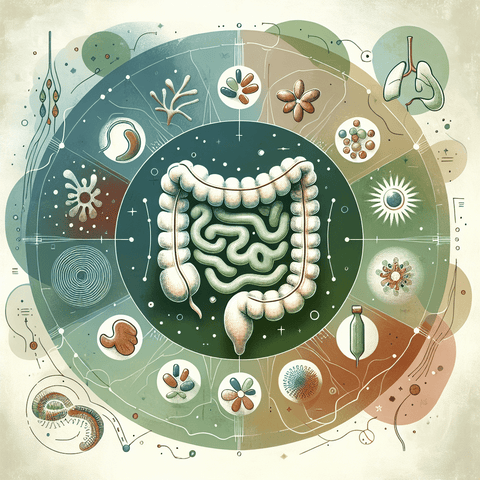Introduction
Maintaining a healthy gut is fundamental to overall well-being. Our digestive system is responsible not only for breaking down food and absorbing nutrients but also for supporting immune health and even influencing mental health through the gut-brain axis. An imbalance or dysfunction within this complex system can lead to various health issues, including bloating, fatigue, nutritional deficiencies, and even neurological symptoms. Given its importance, supporting gut health has become a focus of many health-conscious individuals seeking optimal wellness.
While a balanced diet and lifestyle are crucial, nutritional supplements can play a significant role in enhancing gut function. Among these, Vitamin B12 has garnered attention due to its pivotal role in multiple bodily processes, including the health of the digestive system. This comprehensive guide explores the intricate ways Vitamin B12 supports gut health and digestion, revealing the scientific mechanisms behind its benefits and offering practical tips to maximize your gut wellness through this vital nutrient.
Vitamin B12 and its Crucial Role in Nutritional Supplements
Vitamin B12, also known as cobalamin, is a water-soluble vitamin essential for various biological functions. It plays a key role in DNA synthesis, red blood cell formation, and neurological health. Unlike some other nutrients, B12 is uniquely produced by specific bacteria and archaea, and humans primarily obtain it through dietary sources such as animal products—meat, fish, eggs, and dairy. Due to the limited plant sources of B12, vegetarians and vegans might be at higher risk of deficiency, necessitating thoughtful supplementation.
The significance of B12 supplementation extends beyond deficiency prevention. Emerging research underscores its importance in supporting immune function, energy production, and, critically, gut health. B12 supplements come in various forms, including oral tablets, sublingual drops, injectable preparations, and nasal sprays. Each formulation has specific use cases, especially when malabsorption issues arise.
Absorption of B12 is a complex process that depends on several factors. Inadequate intake, compromised digestion, aging, certain medications, and gastrointestinal disorders can impair B12 absorption, leading to deficiency states that negatively impact overall health and gut function. Consequently, ensuring adequate B12 levels through appropriate supplementation is vital, particularly for individuals with digestive issues or increased nutritional needs.
Microbiome Balance: How Vitamin B12 Impacts Gut Microbial Ecology
The human gut hosts trillions of microorganisms, composing the gut microbiome—a dynamic ecosystem intricately linked to various aspects of health. A diverse and balanced microbiome is associated with effective digestion, immune resilience, and even mental well-being. Disruptions in microbial diversity, known as dysbiosis, are implicated in conditions such as irritable bowel syndrome (IBS), inflammatory bowel disease (IBD), and metabolic disorders.
Vitamin B12 influences microbiome diversity by supporting the growth and sustenance of beneficial bacterial populations. Certain gut bacteria can synthesize B12, but the availability of this vitamin in the gut environment ensures the survival of other bacterial species that depend on it. When B12 levels are insufficient, microbial diversity tends to decrease, favoring the proliferation of less beneficial bacteria, leading to dysbiosis.
Low B12 status has been linked to reduced diversity in microbial populations, which can compromise digestion and immune function. Conversely, adequate B12 levels promote a healthy microbial balance, support the production of short-chain fatty acids (SCFAs), and enhance gut barrier integrity. Strategies such as targeted B12 supplementation, especially in conjunction with prebiotics and probiotics, can optimize microbiome health.
To foster a resilient gut microbiome, individuals are encouraged to incorporate B12-rich foods and consider supplementation if dietary sources are insufficient. Choosing high-quality B12 supplements can help restore microbial balance, supporting digestion, immune defense, and overall wellness. For those interested, exploring options in the B12 category at Topvitamine’s vitamin B12 collection can be advantageous.
Intestinal Absorption of Vitamin B12: Ensuring Efficient Nutritional Uptake
The process of absorbing Vitamin B12 in the human body is remarkably sophisticated, intricately linked to the health of the digestive system. Upon ingestion, B12 binds to intrinsic factor (IF), a glycoprotein secreted by parietal cells in the stomach. This B12-IF complex travels through the small intestine, where specialized receptors in the terminal ileum facilitate its uptake.
Several factors influence the efficiency of B12 absorption. Age-related decline in gastric acid production reduces B12 release from food proteins. Conditions such as atrophic gastritis, pernicious anemia, or surgeries involving the stomach or ileum can impair intrinsic factor production or receptor function, leading to malabsorption. Medications like proton pump inhibitors and metformin are also known to affect B12 absorption negatively.
In individuals with compromised gut health—such as those with Crohn’s disease or celiac disease—mucosal damage can reduce B12 uptake. Supplementing with B12 in alternative forms—like sublingual tablets, nasal sprays, or injections—can circumvent some absorption barriers. Choosing the right supplement form depends on individual health status and specific absorption challenges.
Supporting healthy B12 absorption involves addressing underlying digestive issues, optimizing gastric function, and selecting appropriate supplementation strategies. For example, sublingual B12 drops or lozenges bypass gastric absorption pathways, making them suitable for people with gastric conditions. For those with severe absorption problems, injections provide direct B12 delivery into the bloodstream. For guidance, consult with healthcare professionals and consider high-quality B12 products available at Topvitamine’s vitamin D collection as an example of well-formulated supplements.
B12 Deficiency in Gut-Related Conditions: Recognizing and Addressing the Risks
Several gut-related conditions predispose individuals to Vitamin B12 deficiency. Crohn’s disease, celiac disease, atrophic gastritis, and pernicious anemia all interfere with B12 absorption, either by damaging the intestinal mucosa or reducing intrinsic factor production. Patients with these conditions often experience neurological symptoms, fatigue, and anemia if B12 deficiency persists.
The symptoms of B12 deficiency can be subtle initially—tingling in the extremities, weakness, or cognitive disturbances—but if left untreated, they can escalate to serious neurological deficits, including neuropathy and cognitive impairment. In addition, B12 deficiency impairs red blood cell formation, leading to macrocytic anemia, which exacerbates fatigue and weakness.
Screening for B12 deficiency is crucial, especially in individuals with known gut disorders. Blood tests measuring serum B12, methylmalonic acid, and homocysteine levels help diagnose deficiency accurately. Addressing the underlying cause and restoring B12 levels through supplementation can halt or reverse neurological and hematological complications.
A holistic approach that combines nutritional supplementation, dietary modifications, and managing the primary gut condition is vital for recovery. Injectable B12 therapy is often recommended for severe deficiency cases, while oral or sublingual forms are suitable for maintenance. To support gut health and B12 status simultaneously, visiting Topvitamine’s magnesium supplement page can provide supportive nutrients.
Digestive Enzyme Support: Enhancing Digestion with Vitamin B12 and Enzymes
The breakdown of food into absorbable units depends heavily on digestive enzymes produced by the salivary glands, stomach, pancreas, and small intestine. These enzymes include amylase, lipase, proteases, and others, each targeting specific macronutrients. A deficiency or dysfunction in these enzymes can impair digestion, leading to malabsorption of crucial nutrients, including B12.
Vitamin B12 deficiency can indirectly impair enzyme function by creating an overall state of nutritional deficiency, weakening gastrointestinal mucosa, and disrupting the functions of the cells responsible for enzyme production. Additionally, gastrointestinal conditions like pancreatitis can diminish enzyme output, further compounding absorption issues.
Supplementing with digestive enzymes can improve overall digestion and nutrient absorption, creating a more favorable environment for B12 uptake. Combining B12 with enzymes in specialized formulations enhances the breakdown of food, aiding in better nutrient extraction and reducing symptoms like bloating and indigestion.
When selecting digestive enzyme products, look for formulations that target your specific needs and include ingredients like amylase, protease, lipase, and cellulase. Lifestyle adjustments such as chewing thoroughly, eating smaller meals, and avoiding excessive alcohol or processed foods can further support enzyme activity. For quality enzyme options, see the offerings at Topvitamine’s Omega-3 supplement page.
Nerve Function Enhancement: The Connection Between Gut Health, B12, and Nervous System Support
The gut-brain axis describes the complex bidirectional communication network linking the gastrointestinal system and the central nervous system. A healthy gut can positively influence mood, cognition, and neurological health, while gut dysfunction may contribute to neurological symptoms. Vitamin B12 is crucial for nerve health, playing a vital role in myelin formation, nerve regeneration, and neurotransmitter synthesis.
A deficiency in B12 can impair nerve conduction, leading to symptoms such as numbness, tingling, balance issues, and cognitive decline. Additionally, the enteric nervous system—the intrinsic nerve supply of the gut—relies on B12 to function optimally. Disrupted B12 levels can compromise gut motility and secretion, aggravating digestive symptoms.
Supporting B12 levels and gut health concurrently can promote nerve regeneration and provide symptomatic relief. Holistic strategies include B12 supplementation, probiotic use, stress management, and dietary modifications to enhance nutrient absorption. The integration of these approaches fosters resilience within the nervous system and the gastrointestinal tract.
For those exploring potential neurological benefits of B12, considering supplements from Topvitamine’s Vitamin K collection can complement nerve support strategies. Ensuring adequate B12 intake is a cornerstone for nerve and gut health, highlighting the importance of personalized, professional guidance.
Conclusion
Vitamin B12 is an indispensable nutrient that profoundly influences gut health and digestion. From supporting the diversity and balance of the microbiome to ensuring efficient nutrient absorption and nerve function, B12's roles are vast and scientifically validated. Proper supplementation, tailored to individual needs, can help correct deficiencies, mitigate related health issues, and promote overall digestive wellness.
Optimizing your gut health involves a multifaceted approach, including dietary choices, lifestyle modifications, and targeted nutritional support. Consulting healthcare professionals for personalized strategies ensures safe and effective use of B12 supplements. Remember, a healthier gut leads to a healthier you—unlocking the secrets of B12 may be the key to this transformation.
Q&A Section
Q1: How does Vitamin B12 support gut health?
A1: B12 supports gut health by maintaining a balanced microbiome, supporting beneficial bacteria, and promoting gut barrier integrity. It also facilitates nutrient absorption and nerve function within the gastrointestinal system.
Q2: What are the best forms of B12 supplementation for people with poor absorption?
A2: For individuals with absorption issues, sublingual B12 drops, nasal sprays, or injectable B12 are recommended. These forms bypass some of the gastrointestinal barriers and deliver B12 directly into the bloodstream.
Q3: Can B12 deficiency cause digestive problems?
A3: Yes, B12 deficiency can impair gut motility and enzyme production, contributing to symptoms like bloating and indigestion, and can exacerbate conditions like malabsorption syndromes.
Q4: How can I improve B12 absorption naturally?
A4: Improving stomach acid production, addressing gut inflammation or disease, and choosing appropriate supplement forms can enhance B12 absorption. Avoiding medications that impair absorption and ensuring a balanced diet also help.
Q5: Are there specific supplements that support both B12 levels and gut health?
A5: Yes, many products combine B12 with prebiotics, probiotics, and digestive enzymes designed to promote overall gut health. Exploring options on Topvitamine’s magnesium category can provide additional supportive nutrients.
Important Keywords
- Vitamin B12
- Gut health
- Digestive support
- Microbiome balance
- B12 deficiency
- Absorption of B12
- Digestive enzymes
- Nerve health
- Gut-brain axis
- Supplement categories



